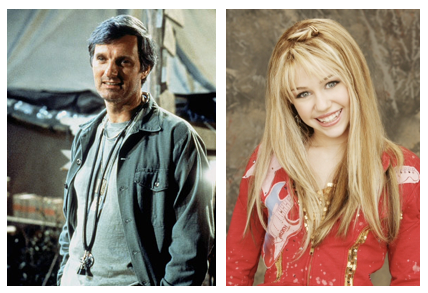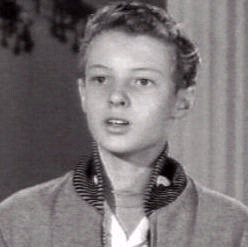[Bianculli here: This is going to be fun. Two of the new contributors to TV WORTH WATCHING are taking opposite sides of a very touchy issue. Namely: Is referring to "vintage" references when writing about pop culture putting things in context, or alienating younger readers being targeted by mass media as necessary for survival?
Today, Tom Brinkmoeller. Tomorrow, in the opposite corner, P.J. Bednarski. And boy, are all of us interested in what YOU have to say on this topic. Read on, and return tomorrow, and weigh in yourself...]

It's 2009. Do YOU know who Eddie Haskell is?
--OK, PJ. My gauntlet is old and unattractive, but I throw it down with as much gusto as my arthritis allows.--
As a Boomer, I know what it's like to have lots of attention pointed at my crowd. While it lasted, it was an intriguing time. Now it's a new season, our leaves fell from the holy tree of demographic influence a while ago, and another set of leaves is eating up the attention.
That's the way it always happens, it's natural, and what follows isn't the ranting of a jilted Geezer Boomer. The relative obscurity is pleasant.

What bothers me is that, in hoping to win the love of the current techo-generation, the country's mega-marketers have decided the "leaves" of previous generations are carcinogenic, at best, and must be destroyed, or at least ignored. They fear that references to anything that predates American Idol or is older than Hannah Montana will offend and confuse the precious target audience and result in an economic catastrophe. What's past, no matter how brilliant or enriching, is no longer prologue. It's a prime target of the delete key.
Television leads the large group of the fearful. The Techno-gens have their own brand of ambition, so contest series -- survivors, racers, bachelors, overeaters, dancers, singers, models, designers and plenty of other lemmings -- just about own prime time because the Technos identify with beating out the rest of the bunch and owning the spotlight.
I wrote a few weeks ago about a current series, Scrubs, and referenced a couple of classic TV shows in the process. A worry was passed on to me that most Technos weren't alive in 1983, when M*A*S*H ended, and that reference probably lost them.
Editor & Publisher, a trade publication that follows newspapers (think of the people who tracked the passenger pigeon into extinction), recently posted a story headlined "Journos Are Alienating Readers With 'Retro' References." The author cited stories he's sure lost many readers because they made references to Leave It to Beaver characters, The Andy Griffith Show, Dragnet, the '60s film Guess Who's Coming to Dinner? and other pieces of the past Technos hadn't lived through.
Are many Technos reading TV WORTH WATCHING? Probably not. Those who do visit the site know it celebrates and explains high quality entertainment. A M*A*S*H reference almost surely didn't offend them, and if they didn't know it, they either did a quick Web search or texted an old person to get the answer.

And newspapers don't alienate readers by talking about Eddie Haskell or Barney Fife, because they never had them to begin with. Newspapers, in the minds of most of the current demographic darlings, are as odd and as obscure as cars with spark plugs, 14.4 modems and telephones you plug into a wall.
David Bianculli recently reviewed a series called The Cougar. The premise is a 40-year-old woman looks for love among a throng of boys half her age. "The Newspaper" would have been a more descriptive title. Print executives across the country have turned their backs on their own, the ones that have supported them for years, to chase after much-younger masses that are only interested if the attention can earn them money and fame.
"History builds on itself" once was an accepted axiom. It has been eclipsed by "If it doesn't have a good following on Twitter, it's useless."
Sorry, Miley, but I'm certain Hawkeye Pierce will be remembered long after Hannah dissolves into a small puddle.
--

Tom writes: For a number of years, Tom Brinkmoeller was paid to watch and write about television. That seemingly ideal situation can't match his current one -- watching only what he enjoys, not being held hostage by a paycheck, and not having to steer a TV story through editors who think watching television impairs the brain as well as social status.